Your personal El Palmar surf guide
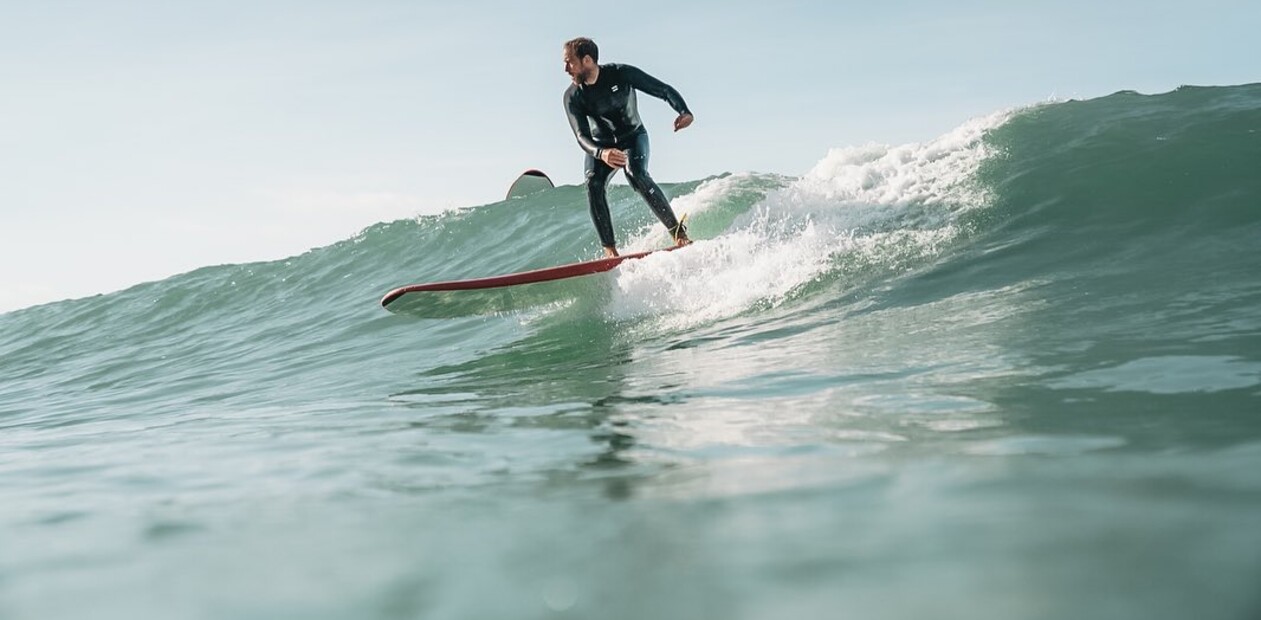
Why is El Palmar the ultimate surfing destination in Europe?
There are thousands of beaches with waves in Europe, so what makes El Palmar so special? Nestled on Spain’s picturesque southern coastline, El Palmar is all about perfect waves, sunny weather and a laidback atmosphere. Whether you’re learning or levelling up, there's no better place to begin your learn-to-surf journey in Europe.
- Uncrowded lineups
- Beginner and advanced waves
- Chilled atmosphere
- Surf-friendly weather
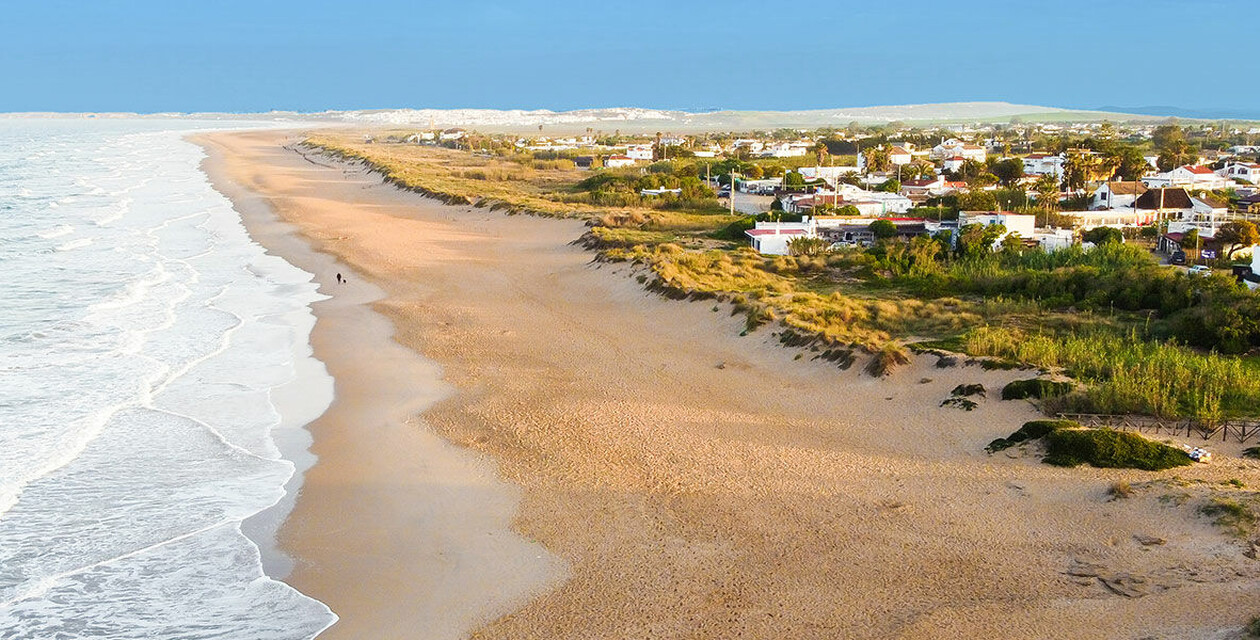
Ready to start your learn to surf journey with A-Frame surf camp?
Located at one of Spain’s best surf spots offering consistent waves for all levels and expansive uncrowded beaches ideal for learning. Our experienced instructors guide you from your first whitewater rides to advanced manoeuvres providing personalised feedback in a relaxed small-group setting. You’ll gain ocean knowledge, build confidence and refine your technique with video analysis and tailored support every step of the way.
Learn to surf with A-Frame
More than just theory and technique
Learning to surf at A-Frame goes beyond technique.
It’s about understanding the ocean, respecting the waves and embracing the surf culture.
Between sessions you can connect with fellow surfers, share insights and unwind in a space that fosters growth, awareness and a true sense of community - both in and out of the water.
Yoga and surfing: A match made in heaven
Daily yoga for surfers: Stretch, strengthen, and prepare your body and mind for the waves with expert-led sessions
Fully equipped beachfront yoga house: Practice with breathtaking ocean views and all props provided for total comfort
Highly experienced teachers: Learn from skilled instructors in various styles, including Vinyasa, Yin, Hatha, mindfulness, breathwork and meditation
Special yoga retreats: Immerse yourself in deep practice with twice-daily classes, walking meditations and workshops
Surf with confidence: Yoga helps build balance, mobility and endurance, giving you more confidence in the water
Nourishing locally sourced food: Enjoy healthy, flavourful meals designed to fuel your body and recovery after an active day
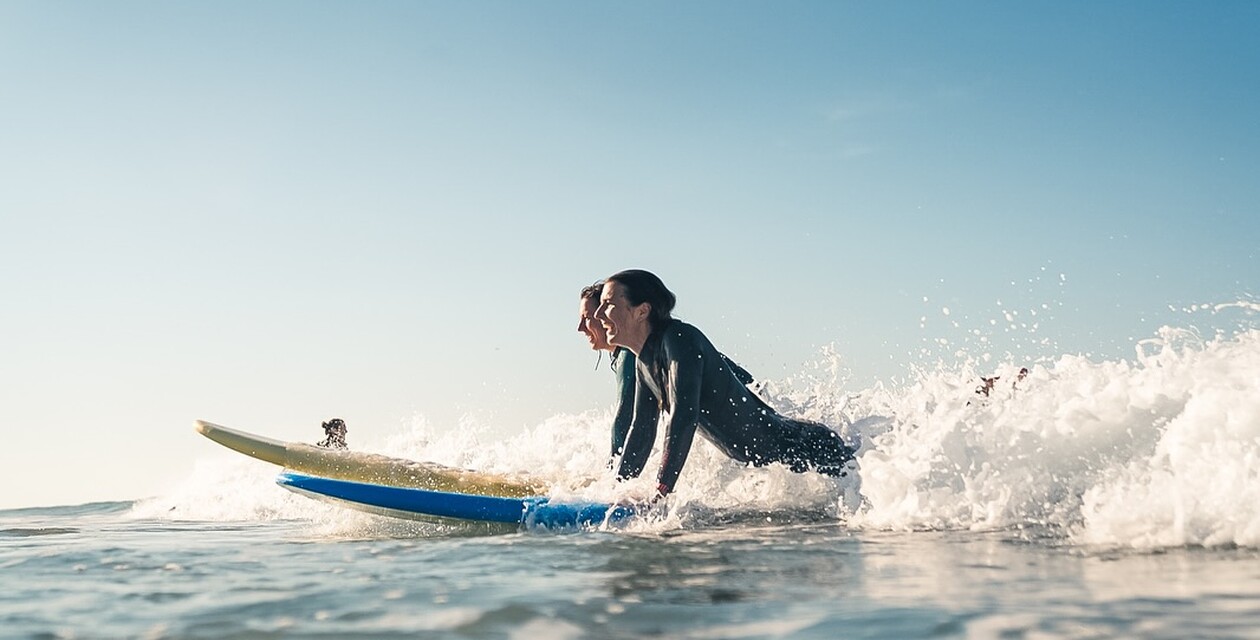
Die richtige Ausrüstung zum Surfen lernen im A-Frame Surfcamp
Die Wahl der richtigen Ausrüstung ist entscheidend, wenn du das Surfen lernen oder verbessern möchtest. Im A-Frame Surfcamp musst du dir darüber keine Sorgen machen – wir bieten dir alles, was du für ein großartiges Surf-Erlebnis brauchst. Von der Auswahl an Surfboards bis hin zu passenden Neoprenanzügen ist für jeden Teilnehmer bestens gesorgt, unabhängig von Erfahrungsstufe oder Vorlieben.
Welche Surfboards und Neoprenanzüge bietet A-Frame?
Eines der Dinge, die das A-Frame Surfcamp auszeichnen, ist die große Vielfalt an Surfboards, die allen Bedürfnissen und Fähigkeiten gerecht werden. Ob du ein kompletter Anfänger bist und ein stabiles Softboard für die ersten Wellen suchst oder schon sicherer auf dem Wasser unterwegs bist und dich an ein Shortboard heranwagen möchtest – wir haben das passende Board für dich. Alle Surfboards sind in einwandfreiem Zustand und werden regelmäßig gewartet, um höchste Qualität zu gewährleisten.
Die Neoprenanzüge im Camp sind ebenfalls sorgfältig ausgewählt, um dir maximalen Komfort und Bewegungsfreiheit zu bieten. Das Camp stellt verschiedene Größen (auch für Kinder) zur Verfügung, sodass du immer einen Anzug hast, der den Bedingungen und deinen Bedürfnissen entspricht. Ob kühlere Frühlingswellen oder warme Spätsommertage, wir sorgen dafür, dass du gut ausgerüstet bist und dich im Wasser wohlfühlst.
Persönliche Ausrüstungsberatung durch Surflehrer
Das Herzstück des A-Frame Surfcamps ist die persönliche Betreuung, und das gilt auch für die Wahl deiner Ausrüstung. Unsere erfahrenen Surflehrer stehen dir mit ihrer Expertise zur Seite, um sicherzustellen, dass du genau das Surfboard und den Neoprenanzug bekommst, die für dich am besten geeignet sind. Vor deiner ersten Session nehmen sie sich die Zeit, dich und dein Level besser kennenzulernen und dir die Ausrüstung zu empfehlen, die dir am meisten Sicherheit und Spaß auf dem Wasser bietet.
Ob du dich bei der Boardgröße unsicher bist oder wissen möchtest, welcher Neoprenanzug sich bei bestimmten Temperaturen am besten anfühlt – unsere Surflehrer helfen dir dabei, die optimale Ausrüstung zu finden. Mit dieser individuellen Beratung kannst du sicher sein, dass du bestens ausgestattet bist, um das Surfen mit Vertrauen und Freude zu lernen.
Im A-Frame Surfcamp ist die Ausrüstung nicht nur Mittel zum Zweck – sie ist Teil deines Surf-Erlebnisses. Durch unsere Auswahl und Beratung fühlst du dich auf dem Wasser sicher und bereit, jede Welle in Angriff zu nehmen.
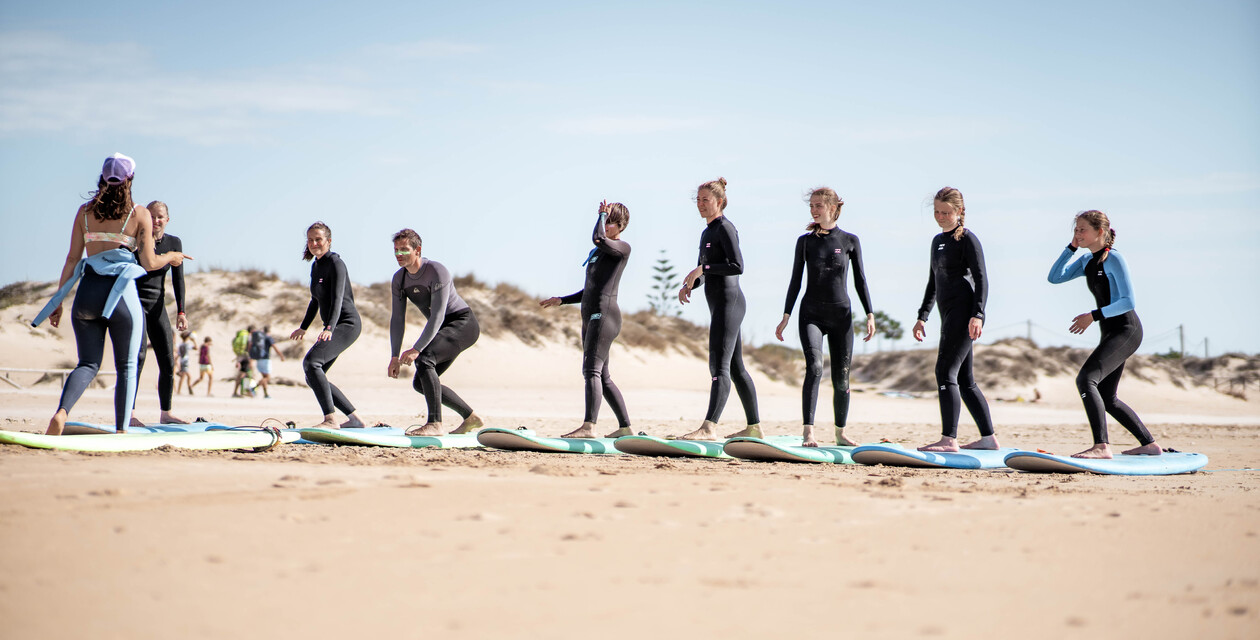
Grundlagen des Surfens im A-Frame Surfcamp
Wenn du dich dafür entscheidest, das Surfen im A-Frame Surfcamp zu lernen, betrittst du eine Welt voller Spaß, Herausforderung und neuer Entdeckungen. Unser Camp legt großen Wert darauf, dass du die grundlegenden Techniken und das richtige Verständnis für den Sport von Anfang an mitbekommst. Wir sorgen dafür, dass du dich gut aufgehoben fühlst und Schritt für Schritt die notwendigen Fähigkeiten erlernst, um sicher und mit Begeisterung auf den Wellen zu reiten.
Theorie-Kurse: Das Verstehen der Wellen vor Ort
Ein guter Surfer beginnt damit, das Meer zu verstehen. In unseren Theorie-Einheiten lernst du, wie sich die Wellen an unserem Surfspot verhalten und welche Faktoren die Bedingungen beeinflussen. Unsere erfahrenen Surflehrer erklären dir, wie du die Wellen lesen und erkennen kannst, welche sich am besten für deine ersten Surferfahrungen eignen. Von der Windrichtung bis zu den Gezeiten – du erhältst wertvolles Wissen, um die Dynamik des Wassers zu begreifen und deine Sicherheit auf dem Wasser zu erhöhen. Außerdem erklären wir dir, welche unterschiedlichen Surfbretter es gibt, und welcher Shape welchen Vorteil bringt. Das Verstehen der Wellen und des Surf-Materials ist die Grundlage für ein erfolgreiches und sicheres Surfen lernen.
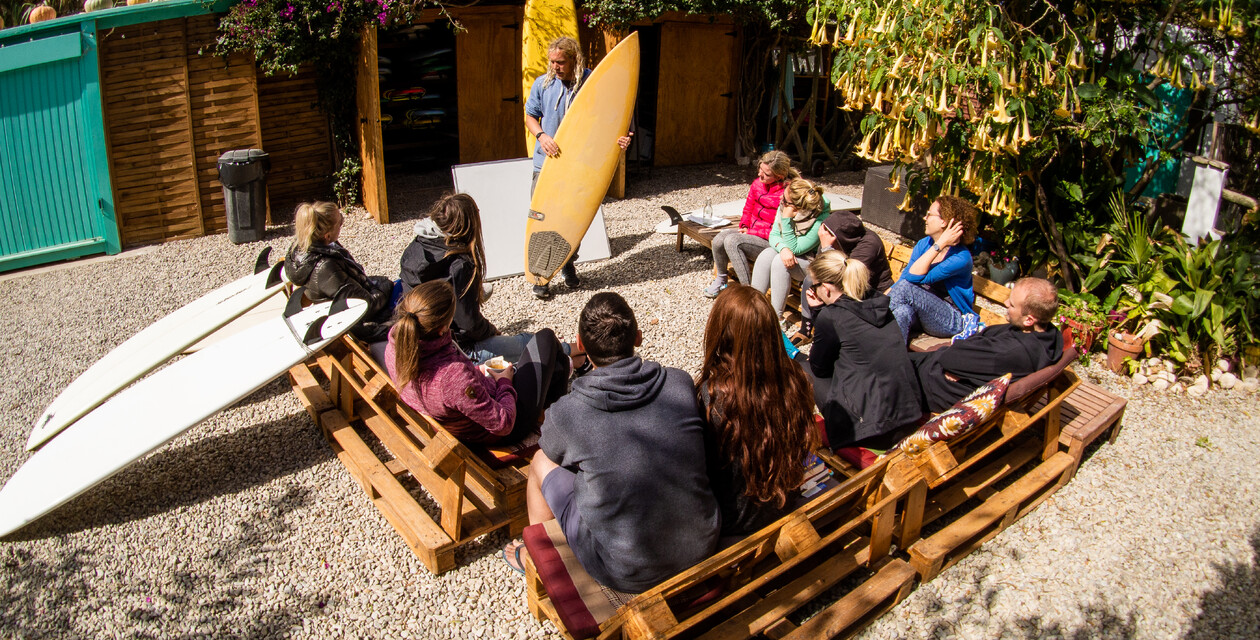
Balance und Technikübungen an Land
Surfen ist nicht nur eine Frage der Technik im Wasser, sondern auch der körperlichen Vorbereitung an Land. Im A-Frame Surfcamp legen wir großen Wert darauf, dass du sowohl physisch als auch mental auf das Surfen vorbereitet bist.
Balance ist das A und O beim Surfen, und wir legen großen Wert darauf, dass du diese Fähigkeit von Beginn an trainierst. Im A-Frame Surfcamp bieten wir spezielle Balance- und Technikübungen an, die dir helfen, die Stabilität auf dem Board zu finden. Diese Übungen werden an Land durchgeführt, bevor du ins Wasser gehst, damit du ein Gefühl für die Bewegungen bekommst und deine Muskulatur vorbereitet ist. Mit spielerischen Methoden und praktischen Tipps helfen dir unsere Surflehrer, die richtigen Positionen einzunehmen und dich auf das Stehen und Surfen vorzubereiten.
Auch Technikübungen, wie das Trockenüben des „Take-Offs“ – dem Aufstehen auf dem Board – gehören zu den Grundlagen. So kannst du die Bewegungen automatisieren, bevor du es im Wasser umsetzt. Dies steigert nicht nur deine Fähigkeiten, sondern auch dein Vertrauen in deine eigenen Fähigkeiten.
Dehnübungen und Aufwärmprogramme vor den Surfstunden
Vor jeder Surfstunde führen wir ein umfassendes Aufwärmprogramm durch, das aus Dehnübungen und leichten Mobilisierungsbewegungen besteht. Das Warm-up bereitet deine Muskeln auf die bevorstehenden Bewegungen im Wasser vor und minimiert das Risiko von Verletzungen. Unsere SurflehrerInnen leiten dich durch eine Reihe von dynamischen Dehnübungen, die sich auf Schultern, Rücken, Hüften und Beine konzentrieren – all die Bereiche, die beim Surfen besonders beansprucht werden.
Diese Aufwärmprogramme sind nicht nur für deinen Körper wichtig, sondern helfen dir auch, dich mental auf die Surfstunde einzustellen. Sie schaffen einen Moment der Ruhe und Konzentration, in dem du dich auf die bevorstehenden Herausforderungen fokussieren kannst. Nach dem Aufwärmen wirst du dich beweglicher und bereit für die Wellen fühlen. :-)
Paddeltechniken und die ersten Schritte auf dem Wasser
Eine solide Paddeltechnik ist der Schlüssel, um effizient Wellen anzupaddeln und deine Position im Wasser zu halten. Im A-Frame Surfcamp lernst du, wie du mit der richtigen Paddeltechnik Geschwindigkeit und Ausdauer entwickelst. Unsere Surflehrer zeigen dir, wie du deine Armbewegungen koordinierst und deinen Körper optimal ausrichtest, um mühelos durch das Wasser zu gleiten.
Sobald du die Grundlagen an Land und die Paddeltechniken beherrschst, geht es daran, die ersten Schritte auf dem Wasser zu wagen. Mit Unterstützung unserer Surflehrer kannst du dich an deine ersten Wellen herantasten und die erlernten Techniken im echten Surferlebnis umsetzen. Dabei wirst du stets von einem erfahrenen Team begleitet, das dir wertvolle Tipps gibt und dich ermutigt, jeden Fortschritt zu feiern.
Im A-Frame Surfcamp sind die Grundlagen des Surfens mehr als nur Theorie – sie sind der Startpunkt für ein Abenteuer, das dich mit jedem Versuch näher an dein Ziel bringt: das Gefühl, frei und mit Freude auf den Wellen zu reiten.

Surfstunden und Unterrichtsmethoden im A-Frame Surfcamp
Im A-Frame Surfcamp legen wir großen Wert darauf, dass du Surfen auf die bestmögliche Art und Weise lernst – mit einer durchdachten Kombination aus Theorie und Praxis, individueller Betreuung und einer Atmosphäre, die Lernen und Spaß miteinander vereint. Hier erfährst du, wie unsere Kurse aufgebaut sind und was du von einer typischen Surfstunde bei uns erwarten kannst. So macht Surfen lernen Spaß!
Wie die Kurse aufgebaut sind: Theorie und Praxis im Wechsel
Unsere Surfstunden sind so gestaltet, dass du ein ganzheitliches Verständnis für das Surfen entwickelst. Der Unterricht wechselt zwischen Theorie- und Praxiseinheiten, damit du nicht nur die Grundlagen und Techniken verstehst, sondern sie auch direkt anwenden kannst. Zu Beginn jeder Einheit gibt es eine kurze theoretische Einführung, in der dir unsere SurflehrerInnen wichtige Informationen zur Wellenkunde, Sicherheit und Technik vermitteln. Dies kann alles umfassen, von der Erklärung der Gezeiten bis zu detaillierten Tipps für deinen Take-Off.
Anschließend geht es ins Wasser, wo du die Theorie in die Praxis umsetzt. Unsere Surflehrer begleiten dich, geben dir direktes Feedback und helfen dir dabei, dein Können schrittweise zu verbessern. Dieser Wechsel zwischen Theorie und Praxis ermöglicht es dir, kontinuierlich zu lernen und dich sicher auf dem Wasser zu bewegen.
Kleine Gruppen für individuelle Betreuung
Ein wichtiger Bestandteil unseres Unterrichts ist die Größe der Gruppen. Im A-Frame Surfcamp sorgen wir bewusst für kleine und feste Gruppen, damit du von einer intensiven und individuellen Betreuung profitierst. Unsere SurflehrerInnen haben so die Möglichkeit, sich auf jeden Teilnehmer einzeln zu konzentrieren, dir gezielt Tipps zu geben und deine Technik zu verfeinern. Diese persönliche Betreuung stellt sicher, dass du in deinem eigenen Tempo lernen und dich optimal weiterentwickeln kannst.
Die SurflehrerInnen sind nicht nur Experten/innen auf ihrem Gebiet, sondern auch leidenschaftliche Coaches, die deine Fortschritte feiern und dir bei Herausforderungen mit Rat und Unterstützung zur Seite stehen. Dadurch entsteht eine positive und motivierende Lernumgebung, in der du dich wohl und sicher fühlst.
Im A-Frame Surfcamp ist jede Surfstunde darauf ausgelegt, dich bestmöglich zu fördern und dir ein einzigartiges und motivierendes Lernerlebnis zu bieten. Hier geht es nicht nur darum, Surfen zu lernen – es geht darum, ein Stück Freiheit und Freude am Meer zu erleben.

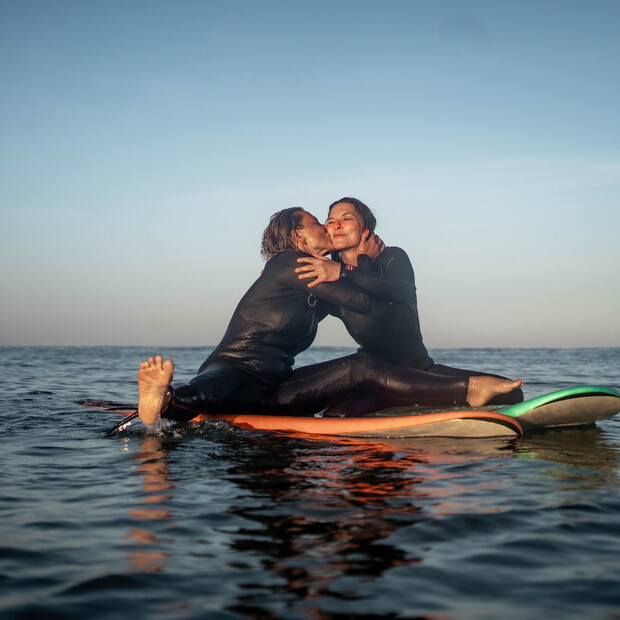
Bereit, unvergessliche Momente auf den Wellen zu erleben?
Lass dich von der einzigartigen Atmosphäre des A-Frame Surfcamps begeistern und starte dein Surf-Abenteuer jetzt! Unsere erfahrenen Surflehrer, die atemberaubende Küste und die herzliche Camp-Gemeinschaft warten auf dich. Zögere nicht – buche jetzt deinen Surfurlaub bei A-Frame und erlebe, wie es ist, mit Freude und Selbstvertrauen die ersten Wellen zu reiten. Dein unvergessliches Surf-Erlebnis beginnt hier!
Allgemeine Fragen zum Surfen lernen
Wie lange dauert es, Surfen zu lernen?
Die Frage, wie lange es dauert, Surfen zu lernen, beschäftigt viele, die sich erstmals auf das Abenteuer einlassen möchten. Die Antwort darauf hängt von verschiedenen Faktoren ab, darunter deine körperliche Fitness, deine Koordination und dein persönliches Engagement. Eines ist jedoch sicher: Surfen lernen ist ein Prozess, der Zeit und Geduld erfordert, aber mit den richtigen Bedingungen und der passenden Unterstützung wird der Weg dorthin zu einer lohnenden Erfahrung.
Im A-Frame Surfcamp legen wir großen Wert darauf, dich Schritt für Schritt an dein Ziel zu bringen. Für die meisten Anfänger dauert es einige Tage, um grundlegende Techniken wie das richtige Paddeln, den Take-Off (das Aufstehen auf dem Brett) und das Halten des Gleichgewichts zu erlernen. Nach etwa einer Woche regelmäßiger Übung sind viele Surfschüler in der Lage, kleinere Wellen eigenständig zu surfen und das Gefühl für das Meer besser zu verstehen.
Wenn du bereits über eine gewisse Grundfitness verfügst und andere Wassersportarten oder Aktivitäten gemacht hast, die deine Balance fördern, kann der Lernprozess beschleunigt werden. Auch die Häufigkeit der Surfstunden spielt eine Rolle: Gäste, die täglich im Wasser sind und unter Anleitung üben, machen deutlich schnellere Fortschritte. Im A-Frame Surfcamp helfen dir unsere erfahrenen SurflehrerInnen dabei, die Lernkurve zu verkürzen, indem sie dir individuelles Feedback und Tipps geben, wie du deine Technik verbessern kannst.
Es ist wichtig zu verstehen, dass Surfen nicht nur aus einer einmal erlernten Technik besteht. Der Weg vom Anfänger zum Fortgeschrittenen erfordert kontinuierliches Üben und die Bereitschaft, sich an wechselnde Bedingungen anzupassen. Manche Wellen sind leichter zu reiten als andere, und das Wetter kann ebenfalls Einfluss auf die Lernbedingungen haben.
Im A-Frame Surfcamp lernst du nicht nur das Surfen selbst, sondern auch, geduldig mit dir zu sein und die kleinen Erfolge zu feiern. Jeder Tag auf dem Wasser bringt dich einen Schritt weiter, und selbst wenn du anfangs vielleicht noch kämpfst, wirst du bald die Freude spüren, wenn du deine erste Welle sicher reitest. Mit der Zeit und Übung wird aus den ersten zaghaften Versuchen ein sicherer Umgang mit dem Brett – und das ist der Moment, in dem du merkst, dass sich jede investierte Stunde gelohnt hat.
Zusammengefasst: Die Dauer, bis du Surfen lernen kannst, variiert, aber mit Engagement, einer guten Anleitung und der richtigen Umgebung – wie sie das A-Frame Surfcamp bietet – wirst du schnell Fortschritte machen und die ersten Wellen erobern können. Und das Beste daran? Der Weg dorthin ist genauso aufregend wie das Ziel selbst. :-)

Wie schwer ist es, Surfen zu lernen?
Surfen lernen ist ein Abenteuer, das Spaß, Herausforderung und Belohnung in sich vereint. Ja, es erfordert Übung und Durchhaltevermögen, aber genau das macht es zu einer so spannenden und lohnenden Erfahrung. Schon vom ersten Moment an, wenn du dich von der Kraft des Meeres mitreißen lässt, spürst du den Nervenkitzel und die Freude, etwas Neues zu lernen. Surfen ist nicht nur ein Sport, es ist eine Reise, bei der du mit jedem Schritt – oder besser gesagt, mit jeder Welle – Fortschritte und Erfolge feierst.
Im A-Frame Surfcamp sorgen wir dafür, dass du das Surfen von Anfang an mit Freude und Zuversicht angehst. Auch wenn es am Anfang vielleicht ein bisschen Übung braucht, um das Gleichgewicht zu finden und den perfekten Moment für den Take-Off zu erwischen, wirst du feststellen, dass diese Herausforderungen Teil des Spaßes sind. Das erste Mal, wenn du dich auf dem Board aufrichtest und die Welle unter dir spürst, ist ein Moment purer Begeisterung – ein Gefühl, das alle Mühe sofort vergessen lässt.
Die Anfänge des Surfens sind geprägt von kleinen Erfolgserlebnissen: Du paddelst die erste Welle an, du hältst für einen Moment die Balance oder du lachst mit deinen Mitstreitern am Strand über die unvermeidlichen Platscher. Im A-Frame Surfcamp wird dieser Lernprozess von unseren erfahrenen Surflehrern begleitet, die wissen, wie sie dir nicht nur Technik beibringen, sondern auch die Freude am Surfen vermitteln. Ihre Tipps, Ermutigungen und persönlichen Geschichten machen jede Unterrichtseinheit zu einer inspirierenden und spaßigen Erfahrung.
Natürlich erfordert Surfen lernen auch, das Meer zu verstehen und zu wissen, wie man sich darin bewegt. Aber anstatt das als Hürde zu sehen, kannst du es als Gelegenheit betrachten, eine tiefe Verbindung mit der Natur aufzubauen. Im A-Frame Surfcamp lernst du, wie du die Wellen lesen und die besten Bedingungen für dein Level erkennen kannst – eine Fähigkeit, die mit jedem Versuch und jedem Lächeln im Wasser wächst.
Ja, Surfen zu lernen hat seine Herausforderungen, aber sie werden immer von Freude und Spaß begleitet. Es ist die perfekte Mischung aus Bewegung, Naturerlebnis und Gemeinschaft. Jeder Moment, den du im Wasser verbringst, trägt dazu bei, dein Vertrauen und dein Können zu steigern, während du gleichzeitig den Augenblick genießt. Und das Beste: Egal, wie lange es dauert, der Weg dorthin ist genauso erfüllend wie das Ziel selbst. Mit der Unterstützung und der positiven Energie des A-Frame Surfcamps wirst du merken, dass Surfen lernen nicht nur machbar, sondern auch ein Riesenspaß ist – ein Erlebnis, das dich mit jedem Schritt näher zu neuen Abenteuern bringt.
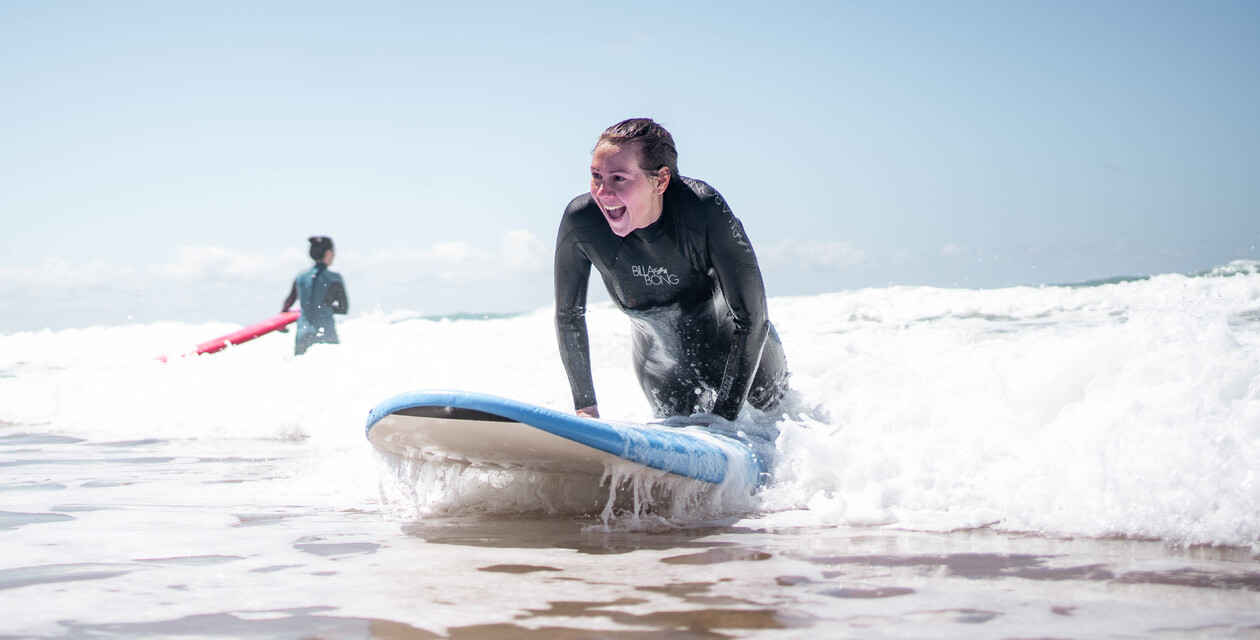
Wie ist der Ablauf beim Surfen lernen?
Der Ablauf beim Surfen lernen ist so gestaltet, dass du Schritt für Schritt Vertrauen, Technik und Freude am Sport entwickelst. Im A-Frame Surfcamp wird dieser Prozess von erfahrenen Surflehrern begleitet, die dafür sorgen, dass du dich vom ersten Moment an sicher und gut betreut fühlst. Hier bekommst du einen Überblick, wie der typische Ablauf aussieht, wenn du Surfen lernen möchtest:
1. Begrüßung und Einführung
Jeder Surfkurs beginnt mit einer herzlichen Begrüßung und einer kurzen Einführung. Unsere Surflehrer stellen sich vor und erklären dir, wie der Kurs aufgebaut ist und was dich erwartet. Du lernst die anderen Teilnehmer kennen und spürst sofort die positive, gemeinschaftliche Atmosphäre, die das A-Frame Surfcamp auszeichnet.
2. Ausrüstung anpassen und vorbereiten
Bevor es ins Wasser geht, wählst du die passende Ausrüstung aus. Die Surflehrer helfen dir dabei, das richtige Surfboard und den optimalen Neoprenanzug auszuwählen, sodass du dich wohl und sicher fühlst. Diese Vorbereitung ist wichtig, um sicherzustellen, dass du die bestmögliche Erfahrung im Wasser hast.
3. Aufwärmübungen und Trockenübungen
Ein guter Surfkurs beginnt mit einem Aufwärmprogramm, das dich auf die bevorstehenden Bewegungen vorbereitet und Verletzungen vorbeugt. Dazu gehören Dehnübungen und leichte Mobilisationsübungen, die den gesamten Körper ansprechen. Anschließend zeigen dir die Surflehrer an Land grundlegende Bewegungsabläufe wie das Paddeln und den Take-Off (das Aufstehen auf dem Brett). Diese Trockenübungen helfen dir, die Technik zu verstehen, bevor du sie im Wasser ausprobierst.
4. Theoretische Einführung
Um dich optimal vorzubereiten, gehört auch eine kurze Theorieeinheit dazu. Hier lernst du, wie du die Wellen lesen, auf Strömungen achten und die richtige Position im Wasser einnehmen kannst. Die Surflehrer erklären dir die Sicherheitsregeln und geben dir Tipps, wie du dich in verschiedenen Situationen verhalten solltest. Diese Einheiten sind wertvoll, um deine Sicherheit und dein Verständnis für das Meer zu stärken.
5. Die erste Surfsession im Wasser
Jetzt wird es spannend: Mit deiner Ausrüstung und dem theoretischen Wissen geht es ins Wasser. Die Surflehrer sind immer in deiner Nähe und geben dir individuelle Hilfestellungen und Feedback. Bei den ersten Versuchen konzentrierst du dich auf das Paddeln und das Einnehmen der richtigen Position auf dem Board. Sobald du dich sicherer fühlst, probierst du den Take-Off aus – der Moment, in dem du dich zum ersten Mal auf das Brett stellst und das echte Surferlebnis spürst.
6. Pausen und Reflexion
Nach der ersten Surfsession gibt es eine Pause, in der du dich ausruhen und dich mit anderen Teilnehmern austauschen kannst. Diese Zeit ist auch eine Gelegenheit, Fragen zu stellen und Feedback von den Surflehrern zu erhalten. Sie geben dir wertvolle Tipps, wie du beim nächsten Mal noch besser werden kannst.
7. Fortlaufende Übung und Aufbau von Fähigkeiten
Der Ablauf beim Surfen lernen ist darauf ausgelegt, dir mit jeder Session mehr Sicherheit und Vertrauen zu geben. Mit jeder weiteren Stunde im Wasser verfeinerst du deine Technik und baust dein Wissen aus. Die Surflehrer passen den Unterricht individuell an deinen Fortschritt an, sodass du in deinem eigenen Tempo lernst und immer neue Herausforderungen meistern kannst.
8. Abschließende Besprechung und Ausklang
Am Ende eines jeden Kurstages gibt es eine Nachbesprechung, in der die Surflehrer zusammenfassen, was gut gelaufen ist und woran du weiter arbeiten kannst. Es ist ein Moment des Stolzes, in dem du auf die Fortschritte des Tages zurückblickst und dich auf die nächste Surfsession freust.
Der Ablauf beim Surfen lernen ist eine Kombination aus Technik, Theorie und vor allem viel Spaß. Im A-Frame Surfcamp wirst du von einer Gemeinschaft unterstützt, die die gleiche Leidenschaft teilt und in der du die Freude am Surfen in einer positiven und inspirierenden Umgebung erleben kannst.
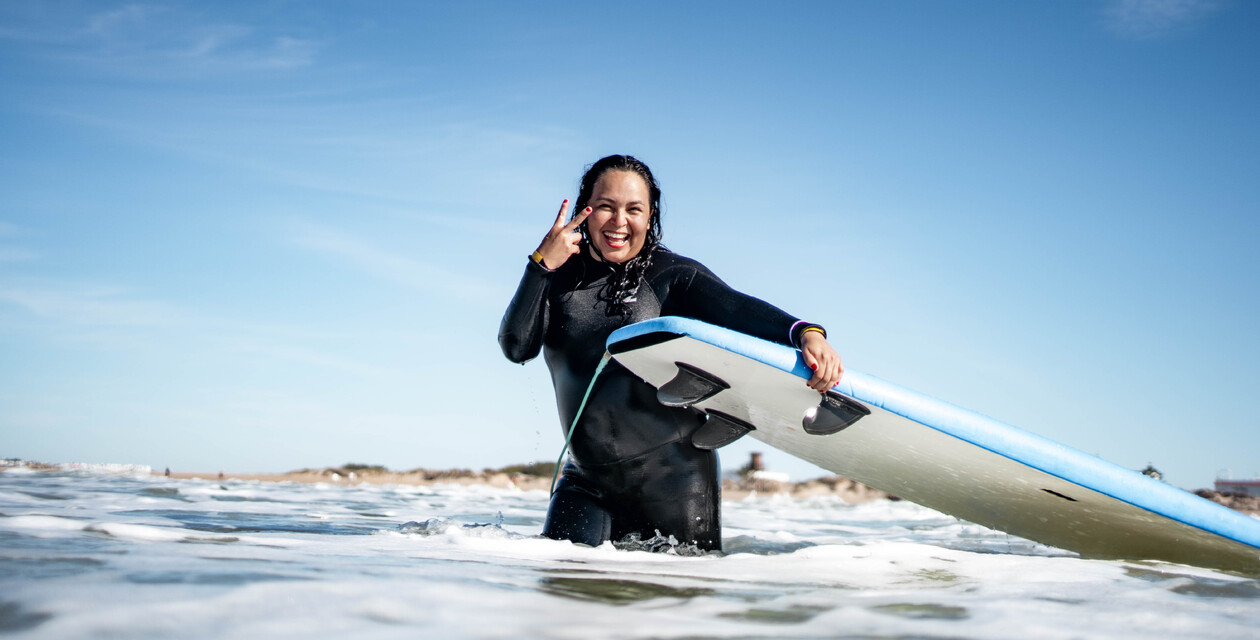
Was sind die Voraussetzungen zum Surfen lernen?
Viele, die das Surfen ausprobieren möchten, fragen sich, welche Voraussetzungen sie mitbringen sollten, um erfolgreich zu starten. Die gute Nachricht ist: Surfen lernen ist für fast jeden möglich, unabhängig von Alter und Fitnessniveau. Dennoch gibt es einige Grundvoraussetzungen und hilfreiche Tipps, die dir den Einstieg erleichtern und den Lernprozess angenehmer machen. Im A-Frame Surfcamp sind wir darauf spezialisiert, Anfänger jeden Alters und Hintergrunds an die Kunst des Surfens heranzuführen.
1. Grundfitness und körperliche Voraussetzungen
Eine gewisse Grundfitness ist beim Surfen hilfreich, da du dich viel im Wasser bewegst, paddelst und beim Aufstehen auf dem Brett deine Muskeln koordinieren musst. Wenn du regelmäßig moderate sportliche Aktivitäten ausübst, bist du schon gut vorbereitet. Besonders vorteilhaft sind eine gute Ausdauer, Schulterkraft und Rumpfmuskulatur, da sie dir beim Paddeln und Stabilisieren auf dem Board helfen.
Aber keine Sorge, du musst kein Spitzensportler sein, um Surfen zu lernen! Im A-Frame Surfcamp legen wir Wert auf alters- und fitnessgerechtes Training, das auf deine persönlichen Bedürfnisse angepasst wird. Mit gezielten Aufwärm- und Kräftigungsübungen unterstützen wir dich dabei, deine Fitness zu verbessern und dich optimal auf die Surfstunden vorzubereiten.
2. Balancegefühl und Koordination
Eine weitere wichtige Voraussetzung ist ein gewisses Maß an Balancegefühl und Koordination. Diese Fähigkeiten helfen dir, stabil auf dem Surfbrett zu stehen und die Bewegungen der Wellen auszugleichen. Falls du hier noch Unsicherheiten hast, ist das kein Problem: Im Camp bieten wir Balanceübungen und Trockenübungen an Land an, die dich Schritt für Schritt vorbereiten. Bereits einfache Übungen wie das Stehen auf einem Balance Board oder Yoga können dir dabei helfen, dein Gleichgewicht zu trainieren.
3. Schwimmfähigkeit
Sicher schwimmen zu können, ist eine absolute Voraussetzung, um Surfen zu lernen. Das Wasser und die Wellen haben ihre eigene Dynamik, und du solltest in der Lage sein, dich sicher im Wasser zu bewegen, auch wenn du einmal vom Brett fällst oder auf eine größere Welle triffst. Im A-Frame Surfcamp achten wir darauf, dass alle Teilnehmer die notwendige Schwimmfähigkeit besitzen und sich im Wasser wohlfühlen.
4. Offenheit und Geduld
Surfen lernen ist ein Prozess, der Geduld und eine positive Einstellung erfordert. Es wird Tage geben, an denen es dir gelingt, deine ersten Wellen zu reiten, und Tage, an denen du mehr üben musst, um Fortschritte zu machen. Diese Herausforderungen gehören dazu und machen den Moment, in dem du endlich auf der Welle stehst, umso lohnender. Die Bereitschaft, sich auf Neues einzulassen und dabei auch Spaß an den kleinen Rückschlägen zu haben, ist eine der wichtigsten mentalen Voraussetzungen beim Surfen lernen.
5. Neugier und Lust auf Neues
Zu guter Letzt ist die Lust auf Neues ein wichtiger Faktor. Surfen ist nicht nur ein Sport, sondern eine Erfahrung, die dich in eine neue Welt eintauchen lässt. Mit einem offenen Geist und der Bereitschaft, etwas Neues auszuprobieren, hast du die besten Voraussetzungen, um das Surfen zu genießen und deine Fähigkeiten weiterzuentwickeln. Das A-Frame Surfcamp bietet eine unterstützende Umgebung, in der du dich frei ausprobieren kannst und von Gleichgesinnten umgeben bist, die dich motivieren und mit dir gemeinsam das Abenteuer Surfen erleben.
Fazit: Surfen lernen kann jede(r)
Ob jung oder alt, fit oder eher sportlich unerfahren – die wichtigsten Voraussetzungen, um Surfen zu lernen, sind eine positive Einstellung und die Bereitschaft, sich auf das Erlebnis einzulassen. Mit der richtigen Vorbereitung, der Unterstützung erfahrener Surflehrer und ein bisschen Geduld wirst du feststellen, dass Surfen lernen nicht nur machbar, sondern auch unglaublich spaßig und erfüllend ist. Im A-Frame Surfcamp schaffen wir die idealen Bedingungen, damit du dein Surf-Abenteuer starten und jede Minute im Wasser genießen kannst.
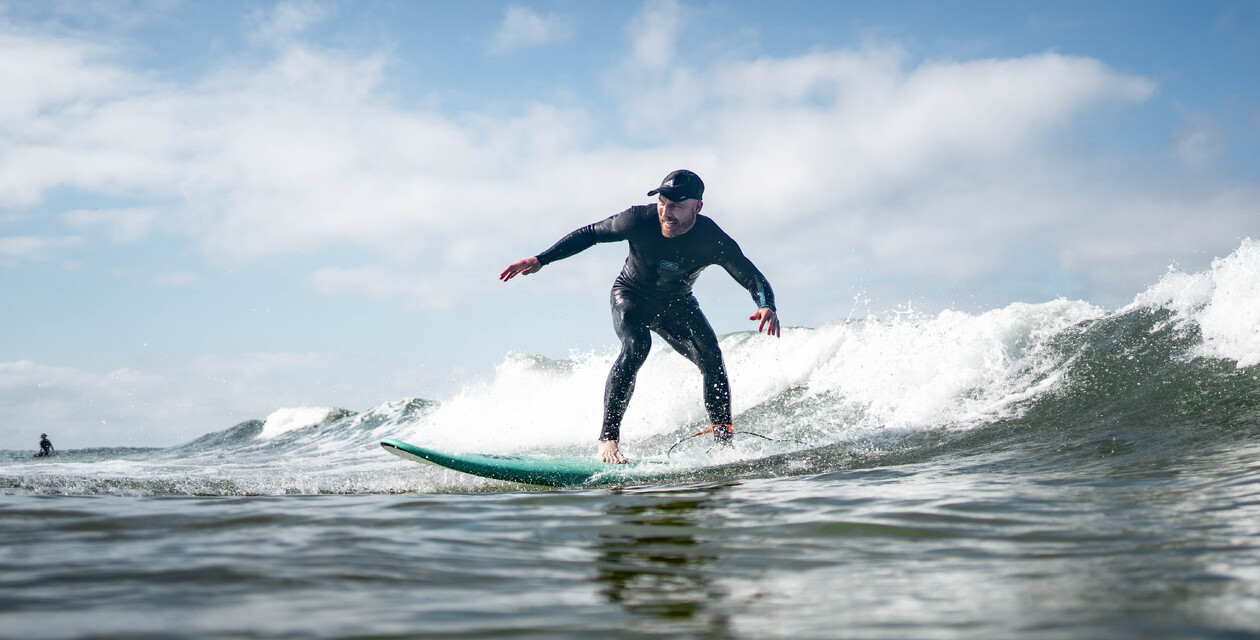
Surfen lernen mit 50 bzw. im Alter
Surfen ist ein Sport, der von Menschen jeden Alters ausgeübt werden kann, und das Surfen lernen mit 50 oder darüber hinaus bringt viele besondere Vorteile mit sich. Im A-Frame Surfcamp haben wir die Erfahrung gemacht, dass es nie zu spät ist, sich der Magie des Surfens hinzugeben und die Freiheit der Wellen zu erleben. Ganz gleich, ob du schon immer davon geträumt hast, surfen zu lernen, oder ob du einfach eine neue Herausforderung suchst – das Surfen im Alter ist eine Bereicherung, die Körper und Geist belebt.
Warum Surfen im Alter eine wunderbare Erfahrung ist
Surfen ist nicht nur ein Sport, sondern eine ganzheitliche Aktivität, die dein Wohlbefinden steigert. Mit 50 oder älter bringst du bereits eine Menge Lebensweisheit und Geduld mit – Eigenschaften, die beim Surfen von unschätzbarem Wert sind. Du weißt, wie wichtig es ist, sich Zeit zu nehmen, neue Fähigkeiten zu entwickeln und den Moment zu genießen. Diese Einstellung hilft dir, dich mit Freude auf das Abenteuer einzulassen und jeden Fortschritt zu feiern.
Im A-Frame Surfcamp sind die Kurse so gestaltet, dass sie an alle Altersgruppen und Fitnessniveaus angepasst sind. Unsere Surflehrer sind darauf geschult, auf individuelle Bedürfnisse einzugehen und den Unterricht so anzupassen, dass er für dich angenehm und effektiv ist. Es geht darum, dein Tempo zu respektieren und dich zu ermutigen, deine Komfortzone zu erweitern, ohne dich zu überfordern.
Was du mitbringen solltest
Beim Surfen im Alter sind einige Dinge besonders wichtig. Eine gewisse Grundfitness hilft dir dabei, das Paddeln und die Bewegungen auf dem Brett zu meistern. Im A-Frame Surfcamp legen wir großen Wert darauf, dass du mit spezifischen Aufwärm- und Dehnübungen startest, die die Gelenke und Muskeln mobilisieren und dich optimal auf die Zeit im Wasser vorbereiten.
Auch Balanceübungen und leichte Krafttrainingseinheiten sind hilfreich, um deine Stabilität zu verbessern – Fähigkeiten, die sowohl beim Surfen als auch im Alltag nützlich sind. Unsere erfahrenen Surflehrer passen das Programm individuell an, sodass du die besten Bedingungen für dein Lernziel hast.
Die Vorteile des Surfens im Alter
Surfen ist ein hervorragendes Training für den gesamten Körper. Es stärkt die Muskulatur, verbessert die Ausdauer und fördert die Koordination. Gleichzeitig ist es eine sanfte Art, aktiv zu bleiben, da du dich im Wasser bewegst und den Widerstand des Wassers nutzt. Surfen hat auch eine beruhigende Wirkung auf den Geist: Das Rauschen der Wellen und die Verbundenheit mit der Natur fördern Entspannung und Achtsamkeit. Viele, die mit 50 oder älter das Surfen erlernen, berichten, dass sie sich dadurch energiegeladener und erfrischter fühlen.
Ein weiterer Vorteil ist die Gemeinschaft im A-Frame Surfcamp. Du triffst auf Menschen, die die gleiche Leidenschaft teilen, und erlebst ein unterstützendes Umfeld, in dem der Spaß am Lernen und das gegenseitige Anspornen im Mittelpunkt stehen. Egal, wie alt du bist – das Gefühl, deine erste Welle zu reiten, ist unbezahlbar und gibt dir das Vertrauen, auch im Leben neue Herausforderungen anzunehmen.
Fazit: Surfen lernen kennt keine Altersgrenze
Das Surfen lernen mit 50 oder im höheren Alter ist eine spannende und erfüllende Erfahrung, die dir neue Energie, Freude und Inspiration bringen kann. Im A-Frame Surfcamp unterstützen wir dich mit erfahrenen Lehrern, personalisierten Programmen und einer Atmosphäre, die dich ermutigt, das Beste aus jeder Session herauszuholen. Das Wichtigste ist, offen für die Erfahrung zu sein und jeden Moment zu genießen – denn Surfen ist mehr als nur ein Sport, es ist ein Lebensgefühl, das dich mit jedem Jahr bereichert.

Conclusion learn to surf
Learning to surf is a great way to become one with the water and nature. Whether young or old - our surf camp offers a complete package with accommodation, food and surf equipment to make getting started as easy as possible.
The focus is on individual support in small groups to ensure maximum learning success. In addition to surfing lessons, we offer additional activities such as yoga or movie nights to keep your surfing vacation varied.
Surf camps are ideal because the focus is on fun, relaxation and a sense of achievement. Surfing is not only fun, but also improves your fitness and offers a great challenge that can inspire enthusiasm at any age. Once you've surfed a wave, you'll know why surfing is addictive.
With the right preparation and equipment, nothing stands in the way of a successful surfing vacation. Whether you're a beginner, advanced or returning surfer - learning to surf is an adventure you shouldn't miss out on. :)

Weitere Infos in unserem Surfblog
Weitere Informationen, Tipps und spannende Geschichten rund ums Surfen findest du in unserem Surfblog! Wir freuen uns auf dich!